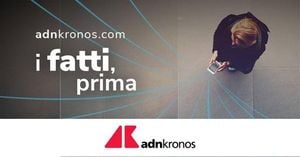On Monday evening, the talk show Hart aber fair conducted a post-election analysis following the recent Bundestagswahl, which saw the Anti-Immigration Party (AfD) gain more than 20% of the votes, solidifying its status as the largest opposition party. This surprisingly strong performance raised questions about the current political climate and the paths forward for Germany’s major parties.
Hosting the discussion, Louis Klamroth brought together several notable guests: Wolfgang Schmidt, head of the Federal Chancellery from the SPD; Philipp Amthor, Bundestag member from the CDU; Marie-Agnes Strack-Zimmermann from the FDP; Andreas Audretsch from the Greens; Liane Bach, the independent mayor of Dillstädt; and journalist Gilda Sahebi, known for her insights on racism and migration policy.
A primary focus during the show was the undeniable strength of the AfD, particularly noted by Sahebi, who pointed out, "The main argument for many voters is: 'They have never been in charge'—and they are right!" This sentiment underlies the AfD's popularity, especially among those frustrated with traditional political parties.
Schmidt echoed these concerns, elaboration on the public dissatisfaction: "There is much anger, which has valid reasons and makes people feel like not enough is being done." He emphasized the need for conventional parties to come together against the rising tide of populism represented by the AfD.
During the debate, Amthor acknowledged the AfD's appeal within the electorate but maintained, "We need to show we understand the issues and are working to resolve them," arguing for dialogue with voters rather than outright dismissal of AfD supporters as extremists. Schmidt and other panelists pointed out, though, the notion of avoiding any form of collaboration with AfD politicians, as they are seen as detrimental to Germany's democratic principles.
Strack-Zimmermann emphasized the urgency for democratic parties to band together against the AfD, declaring, "This is no longer fringe; this is hardcore!" This perspective is echoed by Audretsch, who has been vocal about the need to stop leaving policy gaps which allow the AfD to gain traction.
Yet the discussion did reflect some misgivings about coalition formations and future governance. Amthor expressed disappointment at the limited options available for coalition-building, saying, "I wish we had more government formation choices... This is not the ideal situation many of us hoped for."
Klamroth challenged the group to define what cooperating with the AfD might entail, seeking clarity on party strategies moving forward. The tone sometimes shifted toward confrontation, particularly when discussing migration policies, which had effectively been the centerpiece of the AfD's campaign.
Contributing to this dynamic, Bach, the mayor of Dillstädt—and notable for representing what was once CDU stronghold—offered her perspective on local sentiments. She argued, "East Germans have experienced two forms of society; they feel small changes acutely," relating this to the AfD's growing support, urging collaboration with the party as they too are democratically elected representatives. Amthor, engaging with her ideas, advocated for dialogue with AfD voters but maintained firm opposition to collaborating with AfD officials, stating, "The functionaries are our declared political enemies and do not want to work within the frameworks of a liberal democracy."
Klamroth questioned whether the political establishment was dismissing voters’ concerns, to which Sahebi contended, "There's a misunderstanding; the challenges represented by the AfD cannot merely be labelled as 'nonsense' or 'wrong.' There are valid societal issues at stake." This discussion laid bare not only political divides but also the tensions inherent within the solutions proposed by the traditional parties.
Continuing their analysis, the panel addressed specific policy areas, predominantly migration, which Amthor insisted needed urgent attention, aligning with his party's five-point plan to tighten policies on migrants. The CDU's historical responsibility for migration issues was also acknowledged, with Amthor saying the party bears "a significant part of the blame" but arguing for its efforts to rectify mistakes and improve governance moving forwards.
Schmidt countered this assertion, highlighting the need for collaborative solutions rather than continued partisan blame-fixing. He contended citizens seek leaders who address substantial issues directly and are tired of exaggerated rhetoric about migration and crime.
Despite the back-and-forth dynamic of the conversation, it painted the current political atmosphere as one necessitating dialogue—even among erstwhile opponents—to surmount the challenges posed by rising radicalism. The pressing need for compromise was acknowledged across the panel, yet how this will manifest as parties navigate their new political terrains will be revealed in the coming weeks.
What remained clear by the end of the discussion is the undeniable shift prompted by the recent elections. Major political parties will face the challenge of addressing deep-seated voter frustrations and reining back the AfD’s influence, all requiring cooperation, compromise, and perhaps most critically, genuine engagement with the electorate's concerns.



